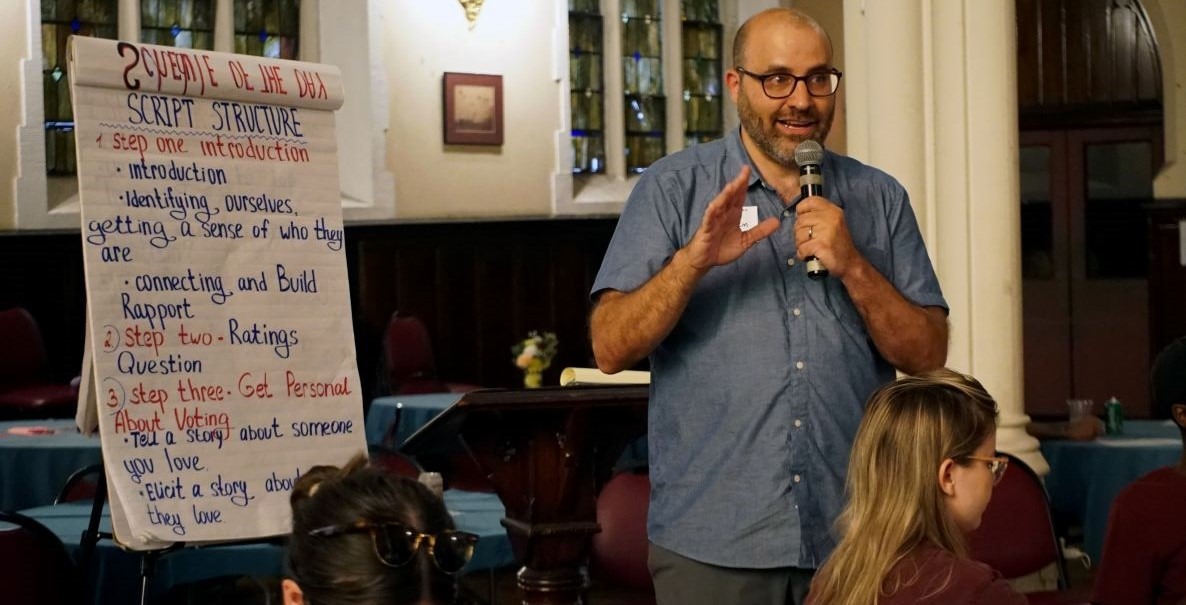This November’s presidential election could once again come down to Philadelphia. And if voter turnout doesn’t go up from April’s primary election — when a dismal 19 percent of registered voters cast ballots — the country could be headed for a descent into autocracy.
So how do you get disillusioned and disinterested people to vote?
Not with scripted talking points or pamphlets, it turns out. And not with quick conversations while knocking on strangers’ doors. The more effective way is through storytelling. If a canvasser tells a deeply personal story — one that’s not even about politics or policy, and instead about someone they love — and gets a nonvoter to do the same, that’s what get results. Simple as that.
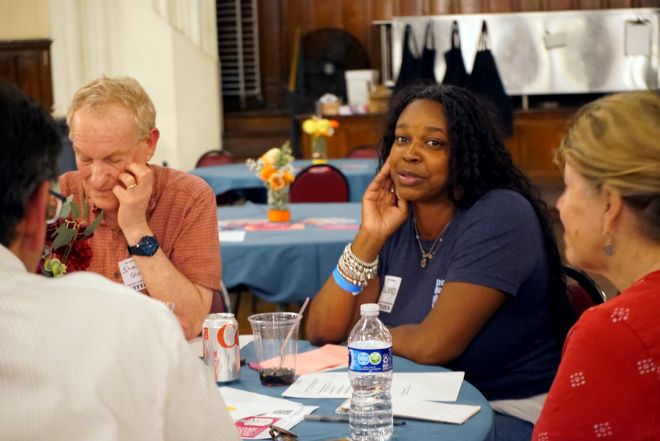
The strategy may seem hippy-dippy, but it’s the crux of an effective and proven tool known as “deep canvassing.” At its core, deep canvassing is focused less on persuasion and more on human connection. It has a success rate that’s 10 to 15 percent higher than normal canvassing, according to Changing the Conversation for Progress (CTC), a West Philly-based organization that trains people on the method of deep canvassing.
Role-playing deep canvassing
“It is a departure from politics as usual,” said Adam Barbanel-Fried, the founding director of Changing the Conversation (CTC), which has both a PAC and a nonpartisan arm. “We have face-to-face conversations and take 10 to 15 minutes to really talk to people who are frequently at risk of not voting.”
On Monday, June 10, The Citizen partnered with the nonprofit arm of CTC and others — WURD, Community College of Philadelphia, Broad Street Love, Young Involved Philadelphia, PhillyBOLT and Committee of Seventy — to host a nonpartisan deep canvassing workshop at Broad Street Love. About 30 people in attendance received a tutorial on deep-canvassing tactics, which was followed by breakout groups where they honed versions of a personal story that might resonate with strangers, and in turn, steer people to vote.
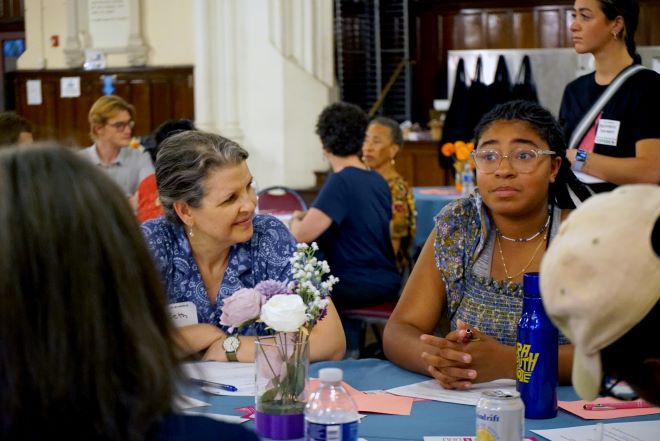
To kick things off, two CTC volunteers performed a role-playing demo that showcased the methodology in action. In the scenario, a deep canvasser approached a stranger on the street with some small talk about the weather, which was quickly followed by a blunt question: “I’m really trying to stop violent extremism from taking over the country. How do you feel about that?” The canvasser then asked how likely were they to vote, on a scale of 0 to 10? “I’d give it a 2,” the stranger replied.
The power of one meaningful conversation
And here’s where the real magic kicked in: Instead of engaging the non-voter on candidates or political issues, the canvasser launched into a relatable story that had nothing to do with the election. He offered a detailed anecdote about a time when his car broke down on the New Jersey Turnpike while moving to a new apartment. His girlfriend swooped in to save the day. “I just felt so loved in that moment. I had somebody who really had my back,” he said. “What about you? Somebody that you love?”
The power of first impressions and a basic understanding of human psychology are the secret sauce of deep canvassing. The technique relies on emotional vulnerability to change minds, rather than facts or statistics. “We’re not persuading anyone,” Barbanel-Fried said later. “It’s not my words that will persuade a voter to vote. It is the words that they hear themselves say.”
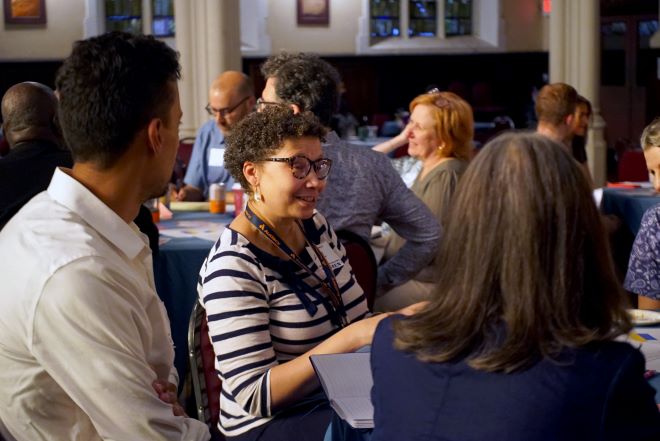
In the role-playing demo, the canvasser listened to the reluctant voter talk about their mother and, once they were finished, re-asked the same question about their likelihood of voting. With no urging on behalf of the canvasser, they now identified themselves as a 7 on the scale. All it took was a reciprocation of personal stories to make significant inroads.
Randomized control trials have demonstrated the efficacy of deep canvassing. But it’s not deeply scientific. CTC has a step-by-step process for how to approach the conversations:
-
- Step 1: Introduce yourself. Get a quick sense for where they stand (hence, the question about extremism). Build a natural rapport.
-
- Step 2: Ask them to assess the likelihood of casting a vote.
-
- Step 3: Tell a personal story about someone you love. Ask them to share about someone they love. Then, restate the question about voting at the end.
“Curiosity is a sign of respect,” said Barbanel-Fried. “Not everyone will talk to you. But 13,000 people have had these conversations with us.”
The bigger picture
During the breakout groups, attendees worked on a useable story of their own. Afterwards, they were invited to share reflections with the entire room.
“What this workshop highlighted is that we can all connect with love and all connect with the fact that we have the same human experience, the same human emotions, and that’s really what we should revert back to,” said Cecilia Schleinitz, a workshop participant and organizer with PA Youth Vote. “That’s the bigger picture.”
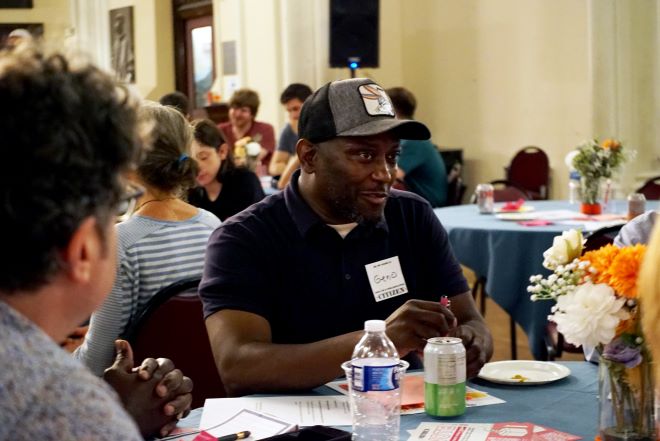
While the workshop lasted for two hours, it served as only an introduction to deep canvassing. On Sunday, June 23, 2024, CTC held a canvassing event in West Philly, starting with a two hour training before participants head out into the neighborhood to talk with people.
Monday night was part of an ongoing series of events and articles by The Citizen about how to
Save Democracy in 2024, which will include other opportunities to learn more about deep canvassing. You can check out our website for more, including The Citizen’s guides on How to Start a Voter Registration Drive and How to Make Democracy Stronger.
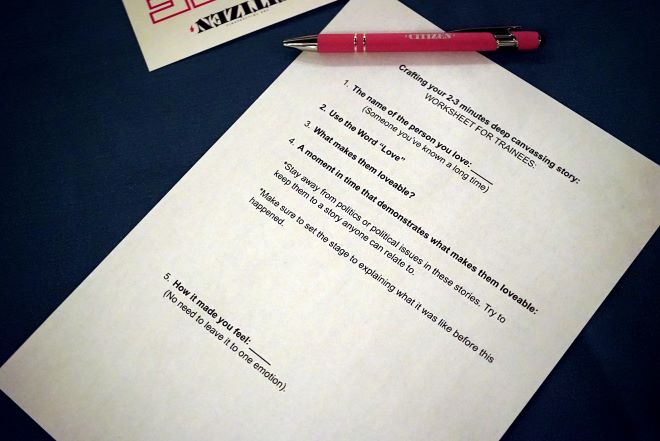
 Every Voice, Every Vote funds Philadelphia media and community organizations to expand access to civic news and information. The coalition is led by The Lenfest Institute for Journalism. Lead support for Every Voice, Every Vote in 2024 and 2025 is provided by the William Penn Foundation with additional funding from The Lenfest Institute for Journalism, Comcast NBC Universal, The John S. and James L. Knight Foundation, Henry L. Kimelman Family Foundation, Judy and Peter Leone, Arctos Foundation, Wyncote Foundation, 25th Century Foundation, and Dolfinger-McMahon Foundation.
Every Voice, Every Vote funds Philadelphia media and community organizations to expand access to civic news and information. The coalition is led by The Lenfest Institute for Journalism. Lead support for Every Voice, Every Vote in 2024 and 2025 is provided by the William Penn Foundation with additional funding from The Lenfest Institute for Journalism, Comcast NBC Universal, The John S. and James L. Knight Foundation, Henry L. Kimelman Family Foundation, Judy and Peter Leone, Arctos Foundation, Wyncote Foundation, 25th Century Foundation, and Dolfinger-McMahon Foundation.
![]()
MORE ABOUT GETTING OUT THE VOTE
Adam Barbanel-Fried, founding director of Changing the Conversation, at Broad Street Love.


